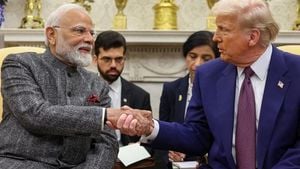As the financial world braces for significant changes, attention is focused on the U.S. employment statistics and Federal Reserve Chairman Jerome Powell's upcoming speech. With President Trump’s new tariffs creating ripples in the market, investors are adopting a risk-off stance, particularly affecting stock prices.
On April 4, 2025, the markets are reacting to Trump's tariffs, which have been reported to be more severe than anticipated. This has led to a heightened sense of caution among investors, prompting a broader risk-averse behavior. The European Union and China have made their opposition to these tariffs clear, positioning themselves firmly against the U.S. stance.
Today, the Chinese and Hong Kong markets are closed for the Qingming Festival, providing a temporary pause for market participants to reassess their strategies amid rising volatility.
The upcoming U.S. employment statistics are crucial, especially to gauge the current state of the labor market in light of the new tariffs. The forecast indicates a rise in non-farm payrolls by 140,000, a slight decrease from the previous increase of 151,000, with estimates ranging between 75,000 and 200,000. The unemployment rate is expected to remain stable at 4.1%, while average hourly earnings are projected to increase by 0.3% month-on-month and 4.0% year-on-year.
Powell's speech at the U.S. Society of American Business Editors and Writers (SABEW) annual conference is anticipated to provide insights into the economic outlook following the tariffs. Analysts are particularly interested in how the Federal Reserve will address the potential inflationary pressures stemming from these tariffs, which Powell has indicated could lead to higher inflation rates in the coming quarters.
In his speech, Powell emphasized that it is premature to discuss appropriate monetary policy adjustments. He stated, "The risks of rising inflation and stagnation are significant, and we need more clarity before considering any policy changes." He further noted that the tariffs could have a lasting impact on the economy, with inflation likely to rise as a result.
According to Powell, while most long-term inflation indicators remain stable, the Fed's responsibility is to ensure that temporary price increases do not escalate into a sustained inflation problem. "The outlook is very uncertain, with high risks of rising unemployment and inflation rates," he commented. Despite these challenges, he affirmed that the economy remains in good shape, showing solid growth and a balanced labor market.
Powell also pointed out that dissatisfaction with the economy seems to stem from past inflation, as prices have not fallen. He remarked, "People are naturally not satisfied when prices are not decreasing, despite a significant reduction in inflation rates. The unemployment rate is close to maximum employment, and data continues to show a robust economy."
However, he acknowledged that uncertainty surrounding new federal policies, particularly trade policies, has increased. The Fed does not foresee a recession but recognizes that external forecasts suggest a higher probability of one. Powell stated, "Tariffs are higher than almost everyone expected, but it is unclear where they will stop. We are in a wait-and-see mode, as are many companies, before making any decisions."
As the market digests this information, many are looking to the Federal Reserve for guidance. Powell stressed the importance of the Fed's independence in monetary policy, stating that it should not engage in other issues to maintain this autonomy. He concluded, "We have time. There is no rush to make adjustments, as the direction of monetary policy remains unclear. We will continue to communicate with other central banks globally and share information to navigate these uncertain times."
In the midst of these developments, ZAiFX! has released its recommendations for the top three FX companies for April 2025, reflecting the shifting landscape of trading. GMO Click Securities' "FX Neo" has been ranked first overall, praised for its high-performance trading tools and user-friendly smartphone app. With a minimum trading unit of 1000 currencies and 24 currency pairs, it remains a top choice for traders.
SBI FX Trade follows in second place, notable for allowing trades from as low as one currency, making it an attractive option for beginners. Its spread on USD/JPY is reported at 0.18 pips, further enhancing its appeal.
Completing the top three is Foreign Exchange Dottocom's "Gaika Next Neo," which offers a competitive spread and a rich array of information for traders. With a minimum trading unit of 1000 currencies and 30 currency pairs, it caters to both novices and experienced traders alike.
As the financial climate evolves, the implications of Trump's tariffs and Powell's insights will undoubtedly shape market strategies in the weeks to come. The ongoing uncertainty calls for vigilance among investors as they navigate these turbulent waters.




